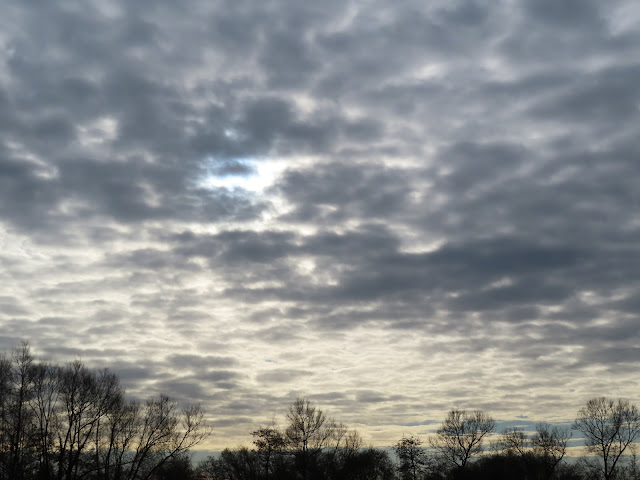Here are the far heights. Field upon
field, sky beyond sky, winter horizons out beyond the back door. Beyond England, even while of it – for this verdant world of their dreams lies far beyond the world where most of them live.
Here the river falls free of its
cradle in the Gloucester Cotswolds, but has yet to attain the Oxford Basin
where Englishnesses truly sink their claims into it. What's left is an in-between space of endless farm fields and deserted villages, anachronistic pillboxes and silent memories of goods or blows whose trade across this once-strategic hinterland has long since left it behind.
Its crossing, the longest slog on this expedition by far, now
presents its most arduous challenge. What better then than to trudge in
at dawn on the coldest day of the year so far, in the wake of a freezing
windstorm, with a meagre eight hours of daylight to make it to Lechlade, the high
trading post and gateway to the Cotswold Hills?
 |
| As the river traverses this
back-of-beyond, the final flares of autumn fade in its cool, dark flow. |
 |
| There’s little else here. It
glides on with no end in sight. |
This is not where the English come to
build futures, to erect towers of pride, to imagine up self-aggrandising
histories. Those who set out for these far reaches more often came to escape the
violence of those delusions. They were migrants. English refugees, whose movements the river welcomed and enabled as has always been its way.
A century and a half ago, as this
nation did up its arrogance in iron and steel and stuck on it the label
of modernity, it was here to this Desolate South that it drove one of that
industrial mis-destiny’s most colourful critics of the time. It was out here,
far from its poisonous stories and still more poisonous air, that this
big-bearded detractor found the space to turn from its ruthless
march and embroider a different path with his own hands. More darkly, it was also here that this
country’s bloodiest spasm of neo-colonial foreigner-killing in recent times claimed
its own highest-profile victim: a bespectacled, mild-mannered scientist who, one
summer afternoon, fled here to take leave of this world altogether.
 |
| From the riverside, a glimpse
of Kelmscott Manor, beloved summer home of William Morris: artist, writer, designer,
translator, socialist and a great deal else besides. |
 |
| Harrowdown Hill, final
destination of weapons inspector Dr. David Kelly. |
The river here is a winterland of escapes
and retreats, deaths and departures, and so too for this long exploration it
heralds the beginning of the end. Here are the last Thames locks, the receding
of riverside settlement, and at Lechlade, the end of its navigable course. We
are almost there.
If you would walk this way too, come
prepared. At 25 kilometres this is the lengthiest stretch of all, and it takes
place entirely across open country. There’s a handful of well-placed pubs but
otherwise next to nothing in the way of shops, public transport, or support if
you get into trouble. Add to that a tight daylight budget – eight hours at this
time of year, and you’ll need every one of them – and you’re looking at serious
peril if you overreach or get stuck out here after dark.
 |
| Upriver from the New Bridge,
where all is as cold as frozen glass. |
 |
| By this point the settlements
are smaller than their labels. Most aren’t even villages, merely clusters of
houses or farm buildings. |
Start: Newbridge (no settlement, just a
bridge with a pub at each end; about five buses a day stop by the Rose
Revived pub on a Witney-Abingdon route)
Length: 25.7km/16 miles
Location: Oxfordshire – City of
Oxford, Vale of White Horse, West Oxfordshire; Gloucestershire - Cotswold
Topics: Harrowdown Hill and the death of
Dr. David Kelly, Shifford, the Duxford detour, Tadpole, Radcot, Kelmscott
and William Morris, Buscot, St. John’s Lock









